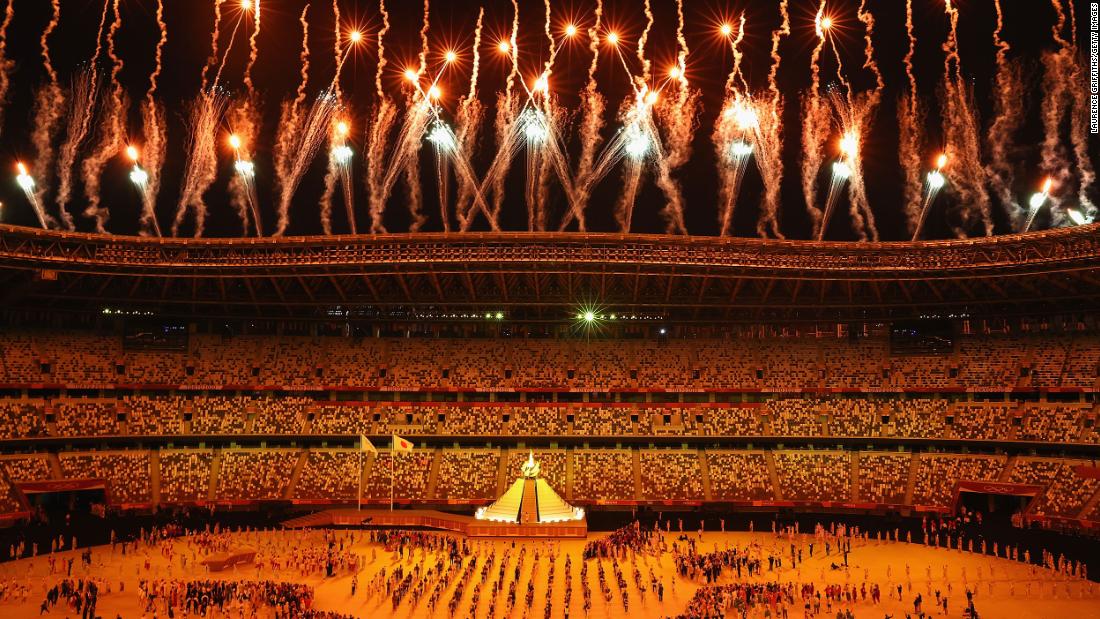The man who revived the Olympic Games after 1,500 years saw them as the “quadrennial celebration of the springtime of humanity.”
To Baron Pierre de Coubertin, the four-year cadence of the Games was like the “rhythm of the stars in their courses” and must be “rigorously maintained.” As in ancient Greece, an “Olympiad may remain uncelebrated if unforeseen circumstances arise to make it impossible, but neither the order nor the number of the Games” should ever be changed.
Since the first modern Olympics in 1896, when all-male teams of athletes from 14 nations competed in Athens, “unforeseen circumstances” in the form of war canceled the Games three times. But only once were they postponed — in 2020, when the Covid-19 pandemic thwarted plans for the Tokyo Games.
Yet finally, a year later and in a swirl of controversy, the Games officially began Friday, when athletes from more than 200 countries took part in an opening ceremony eerily absent of hordes of spectators.
“As thousands gathered outside Olympic Stadium, some in protest wielding signs that read ‘Cancel the Olympics — Save Lives,’ and some in support,” wrote Amy Bass, the Tokyo Olympic Games “asked us to Imagine. With clouds of drones coalescing in the sky to form an image of the Earth, alongside the lyrics of John Lennon’s signature song — sung by an international array of performers that included Americans John Legend and Keith Urban — the spectacle’s theme, ‘moving forward,’ became clear.”
“Rather than a glitzy production filled with highly choreographed dance numbers, the four-hour ceremony contemplated how, especially in the wake of a global pandemic, the sway of sport can keep us connected. The first minutes of the ceremony powerfully offered glimmers of hope for the days ahead, as solitary athletes trained on treadmills and rowing machines, together yet alone, with threads eventually stretching across the infield to connect them, to connect us.”
And who was the star? “None other than 23-year-old tennis star Naomi Osaka — who has made headlines as much for her championing of mental health and her stances in support of Black Lives Matter as for her Grand Slam tennis victories — had the honor, representing on every level what a 21st century athlete from Japan can be. She ascended a replica of Mount Fuji and lowered the flame into the cauldron, designed to look like an opening cherry blossom.”
Even during the pandemic, “there is a ton of money to be made at the Olympics,” wrote Emily Stewart in Vox. “One NBC executive said they believe this could be the most profitable Games ever. And yet, much of that wealth won’t be shared with the event’s most valuable assets: the athletes themselves.”
“You cannot watch TV or exist on the internet right now without running into a Simone Biles ad. The Olympic gold medal gymnast got plenty of well-deserved, high-paying endorsement deals lined up. But she is the exception, not the rule.” Stewart said the vast majority of the 11,000 Olympic athletes and 4,000 people competing in the Paralympics next month “are not rich, or close to it.”
For American gymnasts, the future is now a lot brighter when it comes to money. “Recent changes by the NCAA allow student-athletes to profit off their name, image and likeness,” Ella Donald noted, and that “is ushering in a new, exciting era of the sport. Before, top athletes had to choose between competition and cash.”
Delta fears
The number of new Covid cases reached a six-month high in Tokyo this week, and there were more than 130 cases connected to the Games. The biggest concern there — and around the world — is the Delta variant, which is much more contagious than earlier strains.
Vaccines are “ridiculously effective in preventing people from becoming hospitalized as a result of Covid-19,” but they’re “not a silver bullet,” wrote Dr. Comilla Sasson, an emergency medicine physician. “Even if you’re vaccinated, keep those masks on whenever you’re indoors and when you’re in crowded outdoor settings. Please don’t question if we care about you. Don’t question if we are credible. Don’t question if we are intelligent. Don’t question if we are Republicans, Democrats or whatever.”
Still, the states hardest hit by spiking Covid outbreaks tend to be politically red.
Republican leaders like Sen. Mitch McConnell, Rep. Steve Scalise and Alabama Gov. Kay Ivey spoke out last week in support of getting vaccinated, while others continued to feed anti-vax sentiment. “That there is a divide in the Republican Party over whether to get vaccinated against Covid, and whether to tell millions of Republican voters to consider doing the same, is such a sad commentary on the state of Republican politics today,” SE Cupp pointed out.
“The vaccine is life-saving. The vaccine is safe. The vaccine is effective,” she noted. “And the vaccine is how we are all going to eventually get back to some semblance of normalcy. The longer people refuse, the longer we must wait in this awful state of pandemic limbo.”
Fox News opinion hosts have been among the most prominent voices sowing doubt on vaccines, Dean Obeidallah wrote on Sunday. “The obvious reason is that many at Fox News believe that hurting the Biden administration’s efforts to vaccinate people will help Republicans win in the 2022 midterm elections — and maybe even help Donald Trump if he runs in 2024. If the economy slows down or if there’s a need to close businesses again to contain the virus, Biden could suffer political damage.”
On Monday, one of the network’s leading hosts, Sean Hannity, told viewers he believes in the “science of vaccination” and on Wednesday, Fox News rolled out a public service ad encouraging people to get vaccinated.
Heading in the other direction, Republican Rep. Marjorie Taylor Greene of Georgia posted tweets minimizing the threat Covid poses to people who aren’t obese and are under 65 — and was suspended from Twitter for 12 hours. Jill Filipovic praised Twitter for taking action, but added, “with a Republican Party that refuses to police itself, a right-wing media apparatus that is more propaganda than news or journalism and a stubborn pro-Trump base willing to believe and parrot anything the former president says, American democracy — and truth itself — are in peril. That’s an illness that tech companies like Twitter can only seek to contain; it’s not a disease they can cure.”
America’s northern neighbor began the race to vaccinate its population last winter with a real fear that its supply of the life-saving injections wouldn’t meet the need. But “against all odds, Canadian Prime Minister Justin Trudeau managed to beat a Covid-19 vaccination benchmark that even his counterpart to the south, US President Joe Biden, was unable to meet,” wrote Michael Bociurkiw. “After initially bungling its Covid-19 vaccine rollout, falling behind many other developed nations, including the United States, over the weekend Canada moved ahead of its southern neighbor in per-capita vaccinations.”







